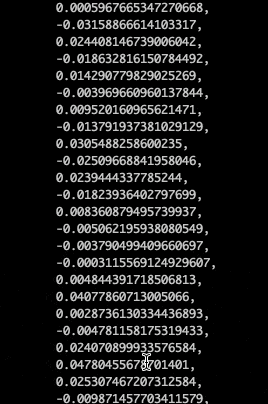To Machines, Do All Lawyers Look the Same?

I used to write very good briefs. Beautiful briefs. The best briefs. Briefs that wove facts and law and reason and righteousness together into plush snuggies judges could wrap themselves in while ruling for my clients.
Here's one of my all-time great briefs:

Not seeing the tokenized brilliance? Well, then, behold these sublime text embeddings:

The craftsmanship just leaps off the page, doesn't it? I was at the height of my juris doctoral powers.
We're All Just Writing Numbers
Indeed, this is what modern thinking machines - LLMs - see when they read and write legal briefs. Some of these numbers are just word symbols optimized for fast processing by powerful computers; the others magically encode complex ideas within a vast multi-dimensional language space.
If I'm being honest, I find this amazing. And quite scary. And also more than a little sad. I spent years (the best ones) and dollars (all of them, for a while) learning how to think profound legal thoughts and write sharp legal words. Now, those words are just a stream of numbers. My number streams look pretty much the same as every other lawyer's number streams. On the other hand, I suppose my number streams look about the same as Shakespeare's or Toni Morrison's.
For better or worse, we should now be thinking of words as numbers. Whether you find it amazing, scary or sad - or a blend of all three like me - this is what's happening. Even these words, which I guarantee are 100% farm fresh original human words, will soon be absorbed into the endless number stream that is patterned, profiled and recycled by LLMs all over the universe. Someday, a little bit of this post's DNA surely will find its way into an AI-generated post (or a hundred of them) about how now really is the end of lawyers.
Are We All Writing the Same Numbers?
If it's true that our work now and into the future is just about writing numbers, how different are my numbers from yours? How much different are Firm A's numbers from Firm B's?
This question's been rattling around in my skull for a couple weeks, since listening to a 3 Geeks podcast with Christian Lang, founder of Lega, where Greg Lambert describes a "Holy Grail" of law firms training or fine-tuning LLMs on their own set of reference data from their internal document repositories. On the surface this makes sense: firms have a lot of documents with a lot of very special expert reasoning and analysis baked into them. It would be cool to imbue an LLM with that valuable expertise. You could bring all this dead knowledge to life by training a machine to think just like the firm.
I don't know the answer, and perhaps others who know more about the intricacies of training and tuning methods will shed more light, but my starting guess would be there isn't much difference. The number gumbo you get from boiling down all of Kirkland's documents will taste a lot like the number gumbo you get from DLA Piper or any other firm. Isn't there a kind of least common denominator effect? Distinctiveness give way to commonality, and everything becomes muddied blend of average.
I really don't know. Just speculating here as part of an exercise in thinking-through-writing. But let's suppose it's true that all we'll get from firms self-training on their own existing data is a thousand shades of beige. What then? When words are numbers, and all the numbers are basically the same, what might lawyers do to cultivate distinctive quality?
How Might We Write Better Numbers?
Can lawyers use their unique knowledge, experience, intuition and effort to purposefully influence the quality of the numbers that the machines working for them will write?
To me, this is far and away the most interesting question about law and generative AI. Unlike the sorry future of lawyer displacement touted by charlatans and grifters, this question points toward empowerment and expansion of the legal profession. If R&D were really a thing in the legal field, this is what all the experiments would be about. If legal education served the future rather than the past, this is what schools would be studying, discovering, sharing and teaching. If law firms treated innovation as a practice rather than promotion, this is where they'd invest.
All I can do here, for now, is ask the question and begin to explore possible answers. But this is what interests me the most and what I hope to pursue in my work ahead.

